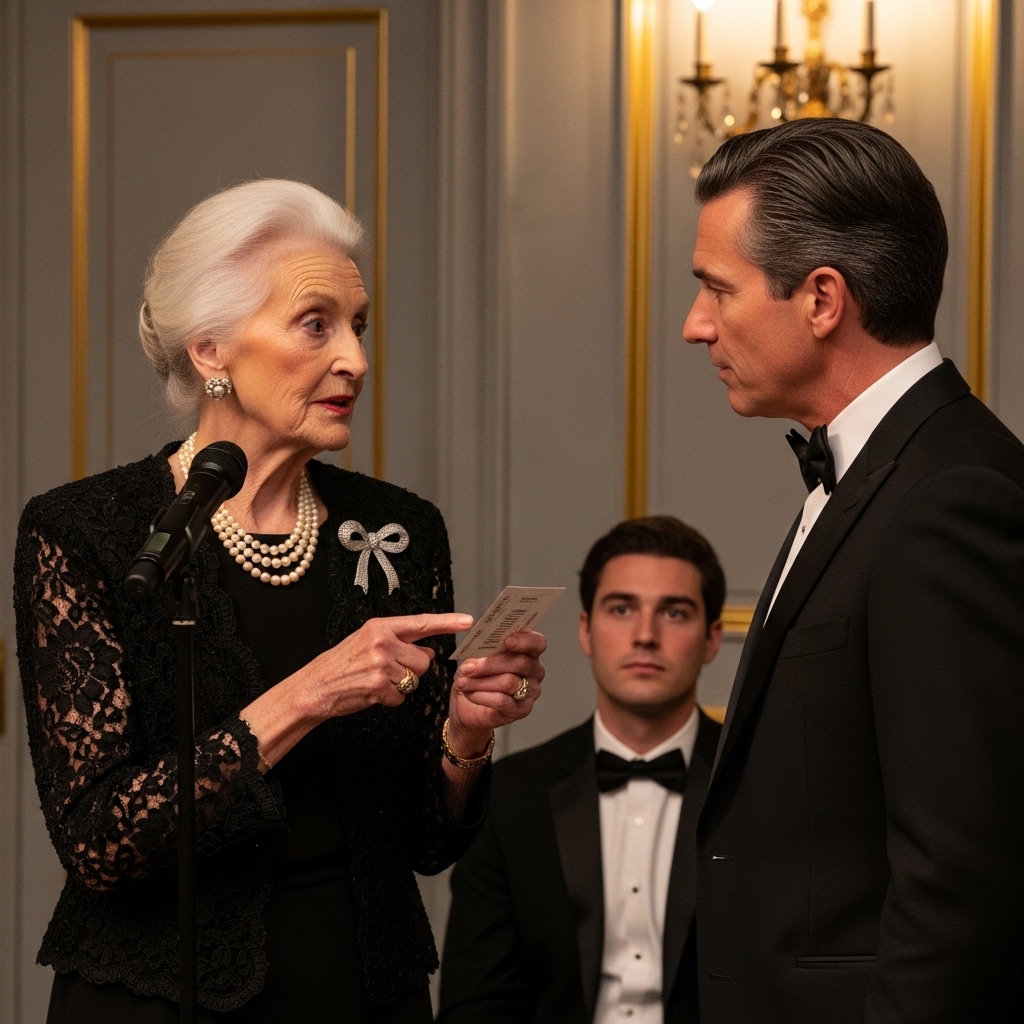Eleanor Vance sat quietly in the back of the Fairmont Hotel ballroom, observing her granddaughter’s wedding unfold beneath sparkling chandeliers and towering displays of champagne. At 85 years old, dressed in her best blue wool dress and practical shoes, she appeared like any other polite grandmother — unremarkable among the glittering crowd in designer gowns and sharp tuxedos.
The ceremony was lavish: crystal-clear ice sculptures, extravagant floral arrangements, and a string quartet playing softly — though few paid attention. The bride’s gown alone cost more than what many earned in an entire year. Eleanor’s wedding gift looked almost laughable next to the mountain of Tiffany boxes and luxury shopping bags stacked by the stage — a small, humble parcel wrapped in brown paper and tied with plain kitchen twine. Inside was an old-fashioned savings passbook, the kind used before the world went digital.
When it came time to open gifts, each expensive item drew applause and delighted gasps from the crowd. Then, the master of ceremonies picked up Eleanor’s tiny package. A ripple of laughter passed through the guests. The groom’s father, Richard Harrison — red-faced, rich, and always hungry for attention — tore it open with theatrical flair.
“Well, well,” he boomed, holding it up. “Looks like Grandma brought her life savings!”
The room erupted in laughter. Richard flipped through the passbook with exaggerated amusement. “Five thousand dollars! That’s adorable, Eleanor. But it wouldn’t even cover tonight’s flowers.”
The laughter swelled. Eleanor offered only a soft smile and stayed silent. She had spent a lifetime around arrogant men who mistook kindness for weakness — and she knew this type all too well.
What no one in that ballroom realized was that the modest-looking passbook represented the origin of a fortune large enough to buy Richard’s company — twice.
Fifty years earlier, Eleanor and her late husband, Arthur — both schoolteachers — had invested their home savings, that very same $5,000, into a fledgling startup led by one of Arthur’s former students. That startup, Acorn Innovations, would become a key player in the personal computing boom. Over the years, through stock splits, acquisitions, and quiet patience, their small investment had grown into a portfolio worth hundreds of millions. But Eleanor never changed her way of living. She preferred simplicity. Privacy. Until Richard decided to turn her into the joke of the night.
One week later, Eleanor called her financial advisor in Switzerland.
“Buy me everything tied to Harrison Development,” she said calmly. “Every loan, every bond, every bit of debt they carry. I want it all.”
Within six months, she owned nearly all of it.
When she entered Harrison Development’s annual board meeting — wearing the same blue wool dress — the room fell into stunned silence. Richard stared, unable to process what he was seeing, as Eleanor stepped to the front and introduced herself.
“I’m here as your primary creditor,” she announced, handing out folders. “As of last week, I hold $120 million of your company’s outstanding debt. I’d like to discuss repayment options.”
Richard stammered. “This must be some mistake—”
“It isn’t,” she said flatly. “That same five thousand dollars you laughed at? It paid for all of this.”
With the calm confidence of a seasoned teacher delivering a lesson, Eleanor outlined her proposal: she would forgive most of the company’s debt in exchange for ownership of its assets and the authority to restructure under new leadership. If they declined, she would foreclose within thirty days.
They had no choice.
Within weeks, Richard’s empire crumbled into Eleanor’s hands. She rebranded the company as Acorn Development, transforming its luxury real estate ventures into projects focused on community: affordable housing, fair wages, and sustainable building practices. What had started as quiet revenge became something far greater — a movement.
When journalists later asked why she hadn’t simply destroyed the Harrison name, Eleanor replied,
“Because this was never about humiliating him. It was about showing that real power isn’t loud — it builds, it lasts.”
In the months that followed, Acorn Development flourished. Eleanor created scholarship programs for young engineers and architecture students, offering opportunities her modest teacher’s salary could never have afforded others in her youth. Her granddaughter Chloe joined her at the foundation, deeply moved and inspired by her grandmother’s quiet strength.
Five years later, at the ribbon-cutting ceremony for Acorn’s largest affordable housing project, Chloe’s husband, Jason, handed Eleanor a small package wrapped in brown paper and tied with twine. Inside was a new savings passbook with a $5,000 deposit and a handwritten note:
“For Grandma Eleanor —
Who taught us that the best investments grow into something greater than money.”
Eleanor smiled.
Her quiet lesson had taken root.
True wealth, she thought, isn’t measured by what you show off — but by what you build that lasts beyond you.
